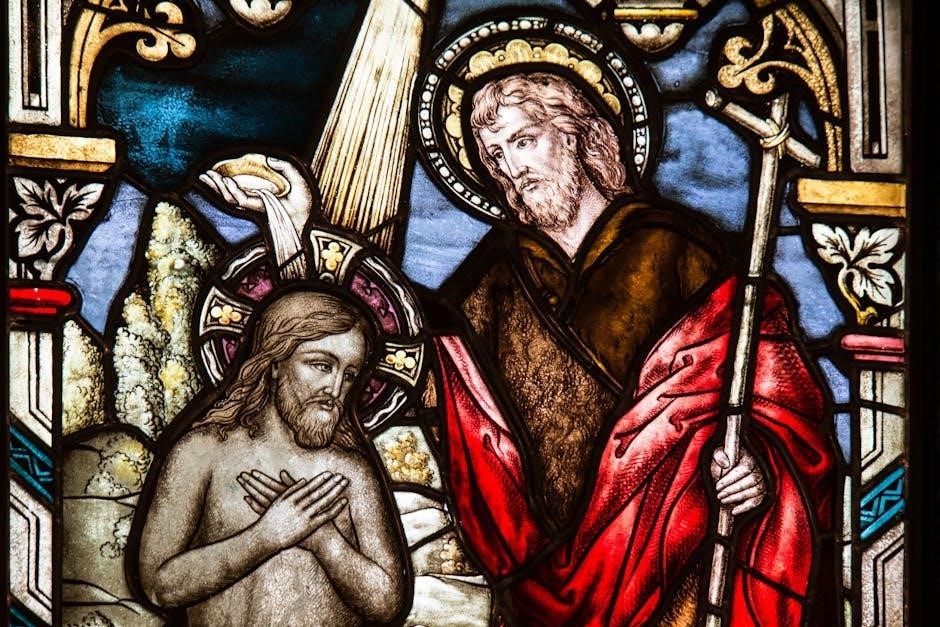The 72 Names of God are powerful spiritual tools derived from three verses in Exodus, each forming 3-letter sequences. These names hold deep mystical meanings, offering healing, protection, and divine connection, while serving as keys to unlock spiritual growth and transformation in various aspects of life.
Overview of the 72 Names of God
The 72 Names of God are a collection of powerful, three-letter sequences derived from Exodus 14:19-21. Each name is formed by combining letters from these verses, which are arranged in a specific order and pattern. These names are deeply rooted in Kabbalistic teachings and are believed to embody divine attributes, offering tools for spiritual growth, healing, and protection. They are often used in meditation and spiritual practices to connect with divine energies and manifest positive change in life. The names are not just random combinations but carry profound meanings, each associated with specific qualities such as abundance, strength, and transformation. They serve as a bridge between the physical and spiritual worlds, providing a pathway to deeper self-awareness and divine connection.
- Each name is a unique 3-letter sequence.
- Derived from Exodus 14:19-21.
- Associated with divine attributes and spiritual powers.
- Used for meditation, healing, and protection.
These names are a cornerstone of Kabbalistic wisdom, offering practical and mystical applications for those seeking to enhance their spiritual journey.
Historical and Cultural Significance
The 72 Names of God hold profound historical and cultural significance, rooted in Jewish mysticism and Kabbalistic traditions. Originating from Exodus 14:19-21, these names are derived from a specific arrangement of verses, forming 72 unique triplets. They have been used for centuries as tools for spiritual connection, healing, and protection, reflecting the divine attributes of the Almighty. In Jewish tradition, these names are believed to carry the power to bridge the physical and spiritual worlds, offering a pathway to divine energies and transformation. Their cultural impact is evident in their widespread use in meditation, blessings, and rituals, making them a cornerstone of Jewish mystical practices and a symbol of deep spiritual wisdom.
- Rooted in Jewish mysticism and Kabbalah.
- Derived from Exodus 14:19-21.
- Used for centuries in spiritual practices.
- Reflect divine attributes and mystical powers.
These names continue to inspire and guide those seeking deeper spiritual understanding and connection.

Origins and Derivation of the 72 Names
The 72 Names of God originate from Exodus 14:19-21, where each verse is arranged in a specific order—first forward, second reversed, third forward—forming 72 triplets.
The Biblical Source: Exodus 14:19-21
The 72 Names of God are directly derived from Exodus 14:19-21, a passage describing the parting of the Red Sea. Each verse contains exactly 72 letters, which are arranged in a specific pattern to form the names. The first verse is written in its natural order, the second verse is written in reverse, and the third verse is written in its natural order again. This unique arrangement creates 72 three-letter sequences, each holding profound spiritual significance.
These triplets are extracted by aligning the letters of the three verses in parallel rows. The resulting combinations are believed to embody divine attributes, providing tools for healing, protection, and spiritual transformation. The process reflects ancient Kabbalistic wisdom, linking the biblical text to mystical energies and practical applications.
How the Names Are Constructed
The 72 Names of God are constructed from Exodus 14:19-21 by aligning the verses in parallel rows. Each verse contains 72 letters, and when arranged, they form 72 three-letter sequences. The first verse is written in its natural order, the second verse is reversed, and the third verse is written in its natural order again. This method creates the 72 Names, each believed to carry unique spiritual properties and divine energies. The construction process is rooted in Kabbalistic teachings, emphasizing the interconnectedness of letters and their mystical significance. These names are not just random combinations but are carefully crafted to unlock specific blessings, protections, and transformative powers.

Meanings and Interpretations of the Names
The 72 Names of God are believed to hold profound spiritual frequencies, each offering unique meanings tied to healing, protection, and divine transformation. They embody sacred energies for personal growth and connection to the Divine, reflecting ancient Kabbalistic wisdom.
Spiritual and Mystical Significance
The 72 Names of God are deeply rooted in Kabbalistic teachings, representing divine attributes that connect humanity to spiritual realms. Each name embodies a unique frequency, aligning with specific aspects of the Divine, such as chesed (loving-kindness), gevura (strength), and tiferet (balance). These names are believed to hold the power to transcend physical limitations, offering a bridge between the material and spiritual worlds. By invoking them, individuals can access sacred energies for healing, protection, and transformation, fostering a deeper connection to the Divine Source.
The mystical significance lies in their ability to act as spiritual tuning forks, resonating with the soul to restore harmony and purpose. This ancient wisdom provides a profound tool for meditation and spiritual growth, enabling believers to align with divine will and manifest positive change in their lives.
Healing, Protection, and Transformation

The 72 Names of God are revered for their profound healing and protective qualities, offering solace and strength in times of need. Each name serves as a spiritual remedy, addressing specific challenges such as physical ailments, emotional turmoil, and spiritual discord. By invoking these divine attributes, individuals can harness their transformative power to restore balance and harmony in their lives. For instance, the name Mem-Hey-Shin is traditionally associated with healing, while others provide protection against negative energies or adversities.
These sacred names empower believers to transcend limitations, fostering resilience and renewal. Their use in meditation and prayer is believed to amplify intentions, creating a shield of positive energy that guards against harm and nurtures personal transformation.

Practical Uses of the 72 Names
The 72 Names of God are used in meditation, prayer, and rituals to invoke divine energies for healing, protection, and transformation. They guide spiritual growth, helping individuals connect with divine attributes and address life’s challenges through sacred intentions and practices.
Meditation and Spiritual Practices
Meditation with the 72 Names of God involves focusing on specific 3-letter sequences to connect with divine energies. Each name is linked to a particular spiritual intention, such as healing, protection, or transformation. By contemplating these names, individuals can align with their deeper purpose and restore meaning to their lives. The practice often includes visualizing the letters or repeating them aloud to resonate with their vibrational frequencies. This method is believed to enhance spiritual growth, foster inner peace, and open pathways to divine guidance. Regular meditation on these names can deepen one’s connection to the divine attributes of the universe, promoting balance and harmony in daily life.
Invoking Divine Energies
Invoking the 72 Names of God is a sacred practice for connecting with divine power and manifesting positive change. Each name is believed to embody specific attributes of the Divine, such as healing, protection, or transformation. By focusing on these names during meditation or rituals, individuals can align with their energies to seek guidance, strength, or spiritual elevation. The process often involves reciting the names with intention, visualizing their vibrational frequencies, or using them in prayer. This practice is thought to open channels for divine intervention, helping one overcome challenges and attract blessings. The names serve as a bridge between the physical and spiritual realms, enabling believers to experience profound shifts in their lives and inner worlds.

The 72 Names and Kabbalah
The 72 Names of God are deeply rooted in Kabbalistic teachings, representing divine attributes and energies. Derived from Exodus, they form a mystical framework for understanding the Divine in Kabbalah, offering a pathway to spiritual connection and transformation.
Kabbalistic Teachings and the Divine Attributes
The 72 Names of God are central to Kabbalistic teachings, representing divine attributes and energies. Derived from Exodus 14:19-21, these names are structured as 3-letter sequences, each linked to specific divine qualities. They embody attributes like chesed (loving-kindness), gevura (strength), and tiferet (balance), reflecting the divine blueprint for creation. In Kabbalah, these names are believed to connect individuals to divine frequencies, enabling spiritual growth, healing, and transformation. Each name carries profound meaning, accessible through meditation and study, offering a pathway to understand and align with divine will. The 72 Names serve as a mystical bridge between the physical and spiritual realms, fostering deeper connection and fulfillment;
The Role of Gematria in Understanding the Names
Gematria, the Jewish tradition of assigning numerical values to Hebrew letters, plays a crucial role in deciphering the 72 Names of God. Each name, composed of three letters, is analyzed through its numerical equivalent to uncover hidden meanings and divine connections. This system reveals how the names resonate with specific spiritual frequencies, enabling deeper understanding of their purpose and energy. By calculating the numerical values, practitioners can identify patterns and correlations, enhancing meditation and practical applications. Gematria also bridges the names with broader Kabbalistic concepts, such as divine attributes and cosmic forces, making it an essential tool for those seeking to harness the names’ transformative power for healing, protection, and spiritual growth.

The 72 Names in Modern Spirituality
The 72 Names of God are increasingly used in modern spirituality for personal growth, astrological insights, and soul chart connections, offering profound tools for self-discovery and transformation.
Connection to Astrology and Soul Charts
The 72 Names of God are deeply intertwined with astrology, as each name corresponds to specific zodiac degrees and celestial influences. By aligning these names with astrological charts, individuals can gain profound insights into their soul’s purpose and life’s challenges. This connection allows for a deeper understanding of personal strengths and weaknesses, enabling spiritual growth and self-awareness. The names act as a bridge between the divine and the cosmic, offering tools to harmonize one’s energy with universal forces. Many practitioners use these names in meditation during specific astrological events, such as full moons or planetary alignments, to amplify their effects. This integration of sacred names and astrology fosters a holistic approach to spirituality, helping individuals navigate life’s journey with greater clarity and purpose.

Using the Names for Personal Growth
The 72 Names of God are a powerful tool for personal growth, offering insights into overcoming challenges and achieving spiritual balance. Each name carries a unique vibration and meaning, allowing individuals to address specific life issues such as fear, anger, or lack of direction. By meditating on these names, one can connect with their divine attributes, fostering self-reflection and inner transformation. The names also help individuals align with their true purpose, enhancing resilience and faith. This practice encourages emotional healing, mental clarity, and a deeper connection to one’s soul, empowering users to navigate life’s complexities with grace and purpose. Regular use of the names can lead to profound shifts in consciousness and behavior, supporting a journey toward spiritual awakening and self-realization.

Resources and Further Study
Explore PDF guides and charts detailing the 72 Names of God, offering in-depth meanings and practical applications; Recommended readings and references provide comprehensive insights for deeper study.
PDF Guides and Charts
PDF guides and charts on the 72 Names of God offer comprehensive resources for understanding their meanings and applications. These materials often include detailed explanations of each name’s significance, along with meditative practices and spiritual intentions. Many guides provide visual charts that organize the names, making it easier to study and reference their properties. For example, the 72 Names of God Meditation Chart by the Center of Light includespronunciations, purposes, and reflections for each name. These resources are invaluable for both beginners and advanced practitioners, offering a structured framework to explore the divine attributes embedded in these powerful sequences. They serve as practical tools for integrating the teachings into daily life and spiritual routines, ensuring deeper connection and transformation.
Recommended Reading and References
For deeper exploration, recommended reading includes works like “Praying the Names of God: A Daily Guide” by Ann Spangler, which explores divine attributes. The “72 Names of God Meditation Chart” by the Center of Light provides structured meditative practices. Additional resources, such as “The 72 Names of God” by Karen Berg, offer insights into Kabbalistic teachings. These references explain the meanings, historical context, and practical applications of the names, aiding spiritual growth and connection with divine energies. They are essential for understanding the profound significance of these sacred names and their role in Jewish mysticism and modern spirituality. These materials serve as a foundation for further study and application of the 72 Names.
